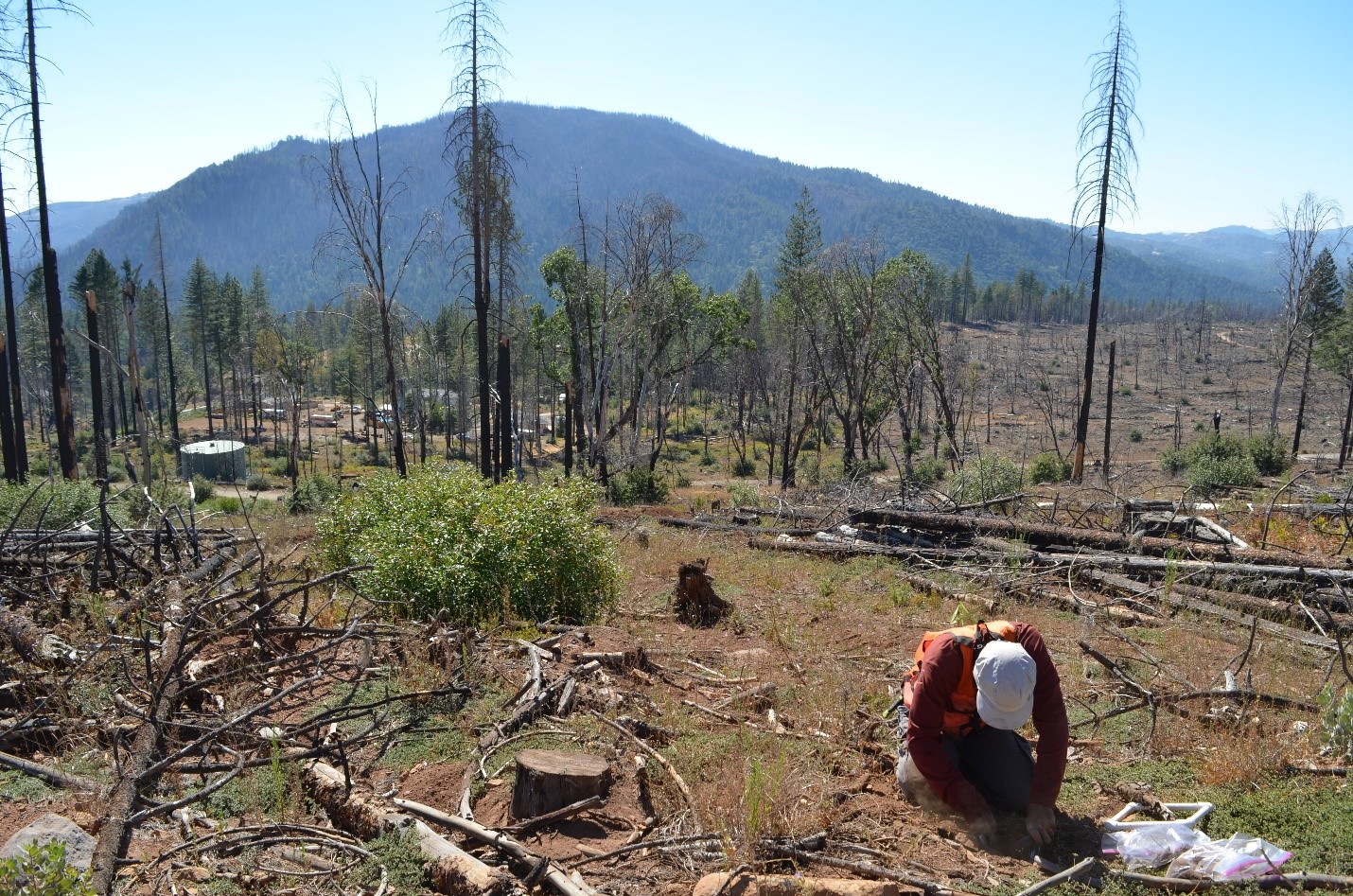Spring 2019 Faculty Research Spotlights
Research Spotlight: Assistant Professor Richard Cobb
By Tate Besser

Forest science master’s student Adrian Poloni measures soil carbon in post-fire
restoration experiments at the Boggs Mountain State Forest.
Assistant Professor Richard Cobb recently led a group of 20 researchers to study tree mortality around the world. Using 14 research sites, they investigated instances of trees dying in various ecosystems. Cobb’s recently published paper, “Ecosystem Dynamics and Management After Forest Die-Off: A Global Synthesis with Conceptual State-and-Transition Models,” endeavors to understand the relationship between the increasing number of global tree die-offs and the environmental signals to watch within ecosystems that are causing these die-offs. “Tree mortality is a global issue. It has many causes, often the tree mortality events that are going on throughout the world are the result of many different factors interacting,” Cobb said. The main challenge researchers face is filtering out the different factors of a tree mortality event. Researchers strive to identify individual contributions within this widespread event in order to determine human contributions.
Cobb’s research found strong evidence that tree die-offs most often are linked to drought, the changes in the frequency and intensity of drought, or the changes in temperature associated with drought. All of those things create stress for forests that make them more susceptible to attack by insects or pathogens or make fires more destructive. These concerns about drought are especially relevant to California forests due to the prolonged drought that California forests are currently recovering from.
“We have two massive tree mortality events that are ongoing,” Cobb said, “One in the Sierra Nevada and one in the California coastal range. These die-offs have different causes but are part of the global issue of tree mortality across the globe … (on every continent) it has been documented to be increasing.”
Due to the increased rainfall received this year, mortality of California trees will begin to slow over the next few years; however, tree mortality will continue to increase in coming decades. Cobb offers a solution to help mitigate the risk of increased tree mortality: “The impact people can have on tree mortality is very local and achievable. In contrast to global system and economic interactions, there is management of forests at a very local level. There are things that we can do to increase the resiliency of our forests and minimize the mortality going forward.”
Mimicking nature’s methods of forest management instead of human-derived methods is a positive step toward better forest management. Cobb wants to promote better management of forests to help preserve and lower stressors that leave them vulnerable to invasive species, thereby increasing the health of forest ecosystems and lowering the global tree mortality rate.
Research Spotlight: Professor Christopher Dicus
By Kyle Rathbone

California experienced the most destructive wildfire season on record in 2018. Across the state, wildfires burned nearly 2 million acres, causing more than $3.5 billion in damage and killing 98 people. The increasing severity of wildfires has been a cause of concern for the state. Professor Christopher Dicus, who studies wildland fires and fuels management, has focused his research on finding a solution to this problem.
Dicus serves as president of the Association for Fire Ecology (AFE), a professional organization dedicated to the research, education and management of fire ecology. He is also a coordinator for the Wildland-Urban Interface (WUI) Module of the California Fire Science Consortium, which distributes important WUI fire information to relevant parties. Through his efforts in these organizations, Dicus hopes to foster better communication and coordination between researchers, communities, planners and the media.
Recognizing that wildfires are a natural part of California’s ecology that can’t be eliminated, Dicus’s research focuses on strategies that can prevent fires from causing catastrophic damage. Utilizing fire-resistant regulations for buildings, incorporating wildland fire resiliency into city planning, and increasing public awareness are measures that he thinks will allow people to coexist with fire. By spreading a better understanding of these preventative approaches, Dicus is working toward his goal of reducing the tragic impact that wildfires can reap on California communities.
For more stories, read the rest of our Spring 2019 Newsletter



 Open: M - F 8am - 5pm
Open: M - F 8am - 5pm